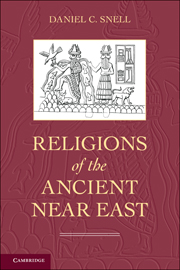Book contents
- Frontmatter
- Contents
- Figures and Maps
- Preface
- Acknowledgments
- 1 Defining Time and Space
- 2 Early Inklings
- 3 Gods, Gods, Gods
- 4 Cities, States, and Gods
- 5 The Lure of Egypt, 4000–1400 BCE
- 6 The Gods of Egypt
- 7 The Akhenaten Dream, 1350–1300 BCE
- 8 Practice in Egypt
- 9 The International Age, 1400–1000 BCE
- 10 Gods and People
- 11 The Lord Is One – Israel in Its Environment
- 12 The Turning
- 13 The Good God and the Bad God
- 14 The Lands of Baal
- 15 Greece, Etruria, Rome, and Conveying Traditions
- 16 The Dead Hand of the Past and the Living God
- 17 Experiencing Ancient Near Eastern Religion
- References
- Index
16 - The Dead Hand of the Past and the Living God
Published online by Cambridge University Press: 05 June 2012
- Frontmatter
- Contents
- Figures and Maps
- Preface
- Acknowledgments
- 1 Defining Time and Space
- 2 Early Inklings
- 3 Gods, Gods, Gods
- 4 Cities, States, and Gods
- 5 The Lure of Egypt, 4000–1400 BCE
- 6 The Gods of Egypt
- 7 The Akhenaten Dream, 1350–1300 BCE
- 8 Practice in Egypt
- 9 The International Age, 1400–1000 BCE
- 10 Gods and People
- 11 The Lord Is One – Israel in Its Environment
- 12 The Turning
- 13 The Good God and the Bad God
- 14 The Lands of Baal
- 15 Greece, Etruria, Rome, and Conveying Traditions
- 16 The Dead Hand of the Past and the Living God
- 17 Experiencing Ancient Near Eastern Religion
- References
- Index
Summary
To write the history of a religion, it is necessary firstly to have believed it (otherwise we should not be able to understand how it has charmed and satisfied the human conscience); in the second place, to believe it no longer in an absolute manner, for absolute faith is incompatible with sincere history.
– Ernest Renan, Vie de Jesus, 107The intense young man with the beautiful eyelashes sat bent over the copies of the ancient Egyptian writing, playing with different combinations of signs along with the few that could already be recognized because of their appearance in royal names on the Rosetta Stone. The Rosetta Stone did not explain much, however, and he still had to work to understand the mass of signs and what was being said in every new inscription that reached him in his rural retreat.
He was in retreat because he was a person of whom the new government was suspicious, for he had supported the Revolution, and worse, Napoleon, hoping, he had told friends, for a new day without the horrible constraints of the old Catholic faith with its myriad rules. He had been one of those modern young men who thought people could be reinvented, made better, by casting off tradition and sharing the achievements of the modern age. Especially he hoped for the demise of the priesthood and its hold on education in France. The nation had been held back for so long by the mindless dictates of the priests that only radical Republicanism and then the Empire had seemed to offer a way out.
- Type
- Chapter
- Information
- Religions of the Ancient Near East , pp. 148 - 161Publisher: Cambridge University PressPrint publication year: 2010



